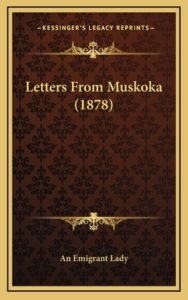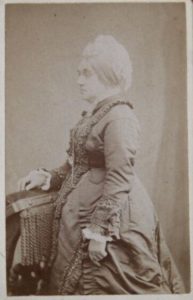
Some years back, after twenty years of searching, I finally “found” my maternal grandfather. I had a last name and diminutive first name, but no location. A few hints that my grandmother gave, along with DNA triangulation at 23andMe, and in August 2017 I finally confirmed Herbert Stanley “Bert” Foreman as the man, and his birthplace as Port Carling, Muskoka, Ontario, Canada.
The genealogy research went fast, as did finding cousins. The library at Port Carling was incredibly helpful with making copies of book pages for me. With the location being totally knew to me (now mainly a vacation area north of Toronto), I began to look for and acquire books about the area. The ones I got were available on line through Google Books as they were out of copyright. I downloaded four books, and the first one I read was Letters From Muskoka by “an Emigrant Lady”.
I read this several years ago, probably back in 2018, but, being somewhat less familiar with Google Books than I am now, I didn’t save it to my library there. Also, I find that I’m not as prompt at reviewing books I read as e-books, and hence I never reviewed it. This week, wanting to catch up on book reviews, I went looking for “that Muskoka book I read a few years ago” and didn’t find it. Fortunately, through a simple search I found it. In order to write a review of it, I had to give it a bit of a re-read. Mainly, I scrolled ahead to this haunting passage I remembered from the end of the main narrative:
I went into the Bush of Muskoka strong and healthy, full of life and energy, and fully as enthusiastic as the youngest of our party. I left it with hopes completely crushed, and with health so hopelessly shattered from hard work, unceasing anxiety and trouble of all kinds, that I am now a helpless invalid, entirely confined by the doctor’s orders to my bed and sofa, with not the remotest chance of ever leaving them for a more active life during the remainder of my days on earth.
What a sad commentary on her years there. She, a serviceman’s widow for fifteen years, and her adult children were Brits who were living in France when the Franco-Prussian War broke out. When the war ended in 1870, changes in the country made life there less attractive for these British expats. One daughter and family had emigrated to Muskoka, and most of the rest decided to follow.
When the book was first published in 1878 in England, the author was listed as “An Emigrant Lady”. Later editions identified her as Harriet Barbara (Mrs. Charles) Gerard King. She was a widow with four children, at least two adults. At the end of the war, they decided to emigrate to Canada to take up free land being offered in Muskoka. Harriet was 61 at this time.
They arrived in Muskoka, after a major ocean storm in transit, after train delays, after finding themselves without money, in fall of 1871. The hardships began almost immediately, and did not abate for the next four years. Here are other salient quotes from the book.
It was anguish to see your sisters and sister-in-law, so tenderly and delicately brought up, working harder by far than any of our servants in England or France.
We were rich in nothing but delusive hopes and expectations, doomed, like the glass basked…to be shattered and broken to pieces.

Normally I don’t have much sympathy for or interest in those who are, or think they are, part of the aristocracy. They have their good things in life and don’t need my sympathy. But it’s hard to read this and not have a little sympathy for the emigrant lady. In the last day or two, as I read on in the book, I learned that she was a writer and tried to bring income in by writing and submitting articles. At this, she was mostly unsuccessful.
The letters take up the bulk of the book, with a few ancillary sections. I’m not sure that I read beyond the letters. Mrs. King described in great detail the hardships in getting a farm cut out of the rocky woods. All family members saw their health deteriorate due to the hard work and the meagerness of the provisions.
The book did what I wanted it to do: help me to understand the area my long-lost grandfather came from. As I wrote this review, I can see I need to finish the last few short sections of the book. I’ll download it to my phone and begin reading it in the off moments. Then, when I’m sure I finished it, I have three other books about old Muskoka to read. So I’d better get on it.
Unless you have a connection to Muskoka, or you really, really like pioneer stories, there’s no point in reading this. For me, it was a great book. The detail and the quality of the writing make this a 5-star book—for me. For most people, it’s maybe a 3-star book. But, in the beauty of e-books, I’ll keep it in my library for a while.